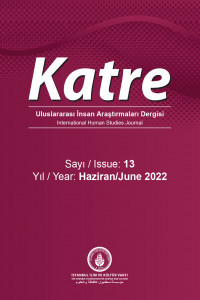Kur’an Kelimelerindeki Mu’cizelik (İşârâtü’l-İ’câz Örneği)
ÖzKelimeler, cümlelerin ham maddeleridir. Kelimelerle konuşur, yazar ve anlaşırız. İnsanıkendine muhatap seçen Yüce Yaratıcı da bizlere kelimelerle hitap etmekte, onlarındillerini, kültür ve anlayış seviyelerini dikkate almaktadır. Gerek Kur’an’da, gerekse diğerilahi kitaplarda insana olan hitap, hep kelimelerledir. Kelimeler, kâh pencere olur bizeöteleri gösterir, kâh rehber olup elimizden tutar, bizi çok ötelere seyahat ettirir. Belagatimamlarından Abdülkahir Cürcanî, Kur’an’ın nazmına dikkat çekerek “Onun mucizeliğininasıl burada aranması gerektiğini” nazara verir. Bunu “nazım nazariyesi” ile ortayakoyar. Cürcanî’ye göre “belagat nazımdadır, tek başına kelimede veya mücerret manadadeğildir.” Bediüzzaman Said Nursi, Cürcanî’nin bu nazariyesini İşârâtü’l-İ’câz isimlitefsirinde Fatiha Suresini ve Bakara Suresinin başında yer alan otuz üç âyeti uygulamalıolarak okuyucuyla paylaşır.AbstractWords are the raw materials of the sentences which they form. We speak with words,write with them, and make agreements through them. The Supreme Creator is One whochooses to answer and address us as humans, and He does this through the medium ofwords that take into consideration the varying languages, cultures and degrees of intellectualcomprehension amongst humanity. No other holy book addresses humanity withall the words as revealed in the Qur’an. The words are like the windows of a lofty palacewhich allow us to see the view through it, and such a palace is a guide which befriendsus and drives us to participate in great and lofty journeys. Abdulkahir Curcani, a leadingscholar dealing with the issue of eloquent rhetoric, observes the composition of the Qur’anand states that “The essence of its miraculousness must be sought here”. He sets forth a“theory of poetics” pertaining to it. According to Curcani “Eloquence is found in poeticverse, and not in solitary words or in abstract meaning”. Bediuzzaman Said Nursi practicallydemonstrates and shares with the reader a similar theory to that of Curcani in hiswork “Signs of Miraculousness” - which provides exegesis of thirty three verses fromSurah Fatiha and Bakara pertaining to this topic.
Anahtar Kelimeler:
Kelime, i’caz, mucize, nazım nazariyesi, belagat, tehaddi, İşârâtü’l- İ’câz
The Miraculousness in the Words of the Qur'an (The Case of Signs Of Miraculousness)
AbstractWords are the raw materials of the sentences which they form. We speak with words,write with them, and make agreements through them. The Supreme Creator is One whochooses to answer and address us as humans, and He does this through the medium ofwords that take into consideration the varying languages, cultures and degrees of intellectualcomprehension amongst humanity. No other holy book addresses humanity withall the words as revealed in the Qur’an. The words are like the windows of a lofty palacewhich allow us to see the view through it, and such a palace is a guide which befriendsus and drives us to participate in great and lofty journeys. Abdulkahir Curcani, a leadingscholar dealing with the issue of eloquent rhetoric, observes the composition of the Qur’anand states that “The essence of its miraculousness must be sought here”. He sets forth a“theory of poetics” pertaining to it. According to Curcani “Eloquence is found in poeticverse, and not in solitary words or in abstract meaning”. Bediuzzaman Said Nursi practicallydemonstrates and shares with the reader a similar theory to that of Curcani in hiswork “Signs of Miraculousness” - which provides exegesis of thirty three verses fromSurah Fatiha and Bakara pertaining to this topic.
Keywords:
Word, I‘jâz, miracle, theory of verse, rhetoric, challenge, Signs of Miraculousness,
___
- BEYDAVİ, Kadı, Envaru’t- Tenzil ve Esraru’t- Te’vil, Ter. Şadi Eren, Işık Yay. İst.
- ISSN: 2146-8117
- Yayın Aralığı: Yılda 2 Sayı
- Başlangıç: 2016
- Yayıncı: İstanbul İlim ve Kültür Vakfı
Sayıdaki Diğer Makaleler
Kur’ân’ın İ‘câz Yönlerinden “Tenâsüb”, Risâle-i Nur Örneği
Kur’an Kelimelerindeki Mu’cizelik (İşârâtü’l-İ’câz Örneği)
Bedüzzaman Said Nursî’de Belagat Kavramı -Kavram Okuması ve Kur’ânî Boyutları-
“Mu‘cizât-ı Kur’âniye Risâlesi” Çerçevesinde Kur’ân’ın “İhbârat-ı Gaybiyye”si
Kur’ân’ın Farklı Bir İ’caz Vechi: Ayet Sonlarındaki Fezlekelerin Esmâ-i Hüsnâ’yı İşaret Etmesi
Kur’ân’ın İ’câzı Üzerine Genel Bir Değerlendirme
Kur’an’ın Meydan Okumasının Arkasındaki Gerçekler
Kur’ân’ın En Güçlü İ’caz Yönü Olan Belâğat Üzerine -Mu’cizat-ı Kur’aniye Risalesi Örneği-
CALL FOR PAPERS 1st International Graduate Students Nursi Studies Conference in India
Kur’ân’ın İ’câz Vecihlerinden Biri Olarak Lafzındaki Câmiiyyet
